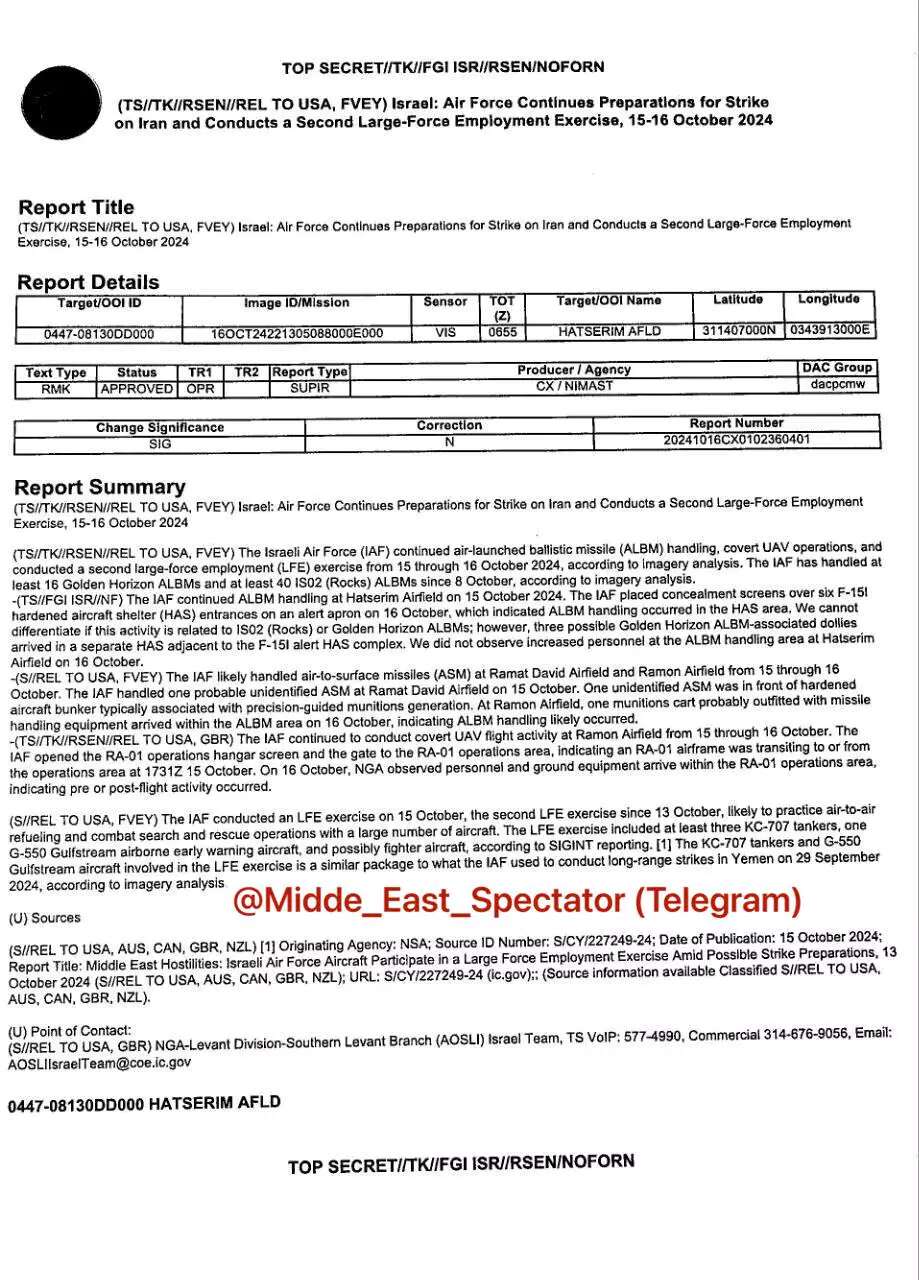- The U.S. is investigating a leak of classified documents that detail Israel's planned strike against Iran, believed to have been shared on Telegram. (CNN.com)
- The documents, marked as top secret, describe Israel's movements of munitions and military exercises, possibly in preparation for an attack on Iran. (FoxNews.com)
- The leak occurred at a sensitive time in U.S.-Israeli relations and could challenge future coordination between the countries. (Telegraph.co.uk)
- The U.S. has not seen indications that Israel plans to use nuclear weapons, though Israel has been dispersing its medium-range ballistic missiles defensively. (NBCNews.com)
- The FBI, Pentagon, and U.S. intelligence agencies are investigating whether the documents were leaked intentionally or through hacking. (Axios.com)
From the U.S. and Israeli government perspective, the leak of these classified documents is seen as a significant security breach that could undermine future coordination and trust between the two allies. The documents, which detail Israel's planned military response to Iran, raise concerns about the reliability of U.S. intelligence operations and their ability to keep sensitive information secure. This could lead to hesitation in future intelligence-sharing, particularly in highly sensitive matters such as military strategies in volatile regions.
From a more skeptical or critical perspective, the leak could be viewed as a deliberate move to manipulate public perception or geopolitical relations. Some may question whether the release of the documents was orchestrated to serve particular political or military interests, possibly to justify future actions or to sway opinion on Israel's preparations for an attack on Iran. Given the highly sensitive nature of the information, this viewpoint considers the leak a potential tool for influencing both domestic and international audiences.
A third perspective might highlight the leak as a moment of forced transparency, emphasizing the need for public accountability in military operations that could have far-reaching consequences. Some observers may argue that this information being exposed allows for greater scrutiny of both Israel’s and the U.S.’s actions, particularly when these actions involve preemptive military strikes. This perspective might stress the importance of open discussion and debate on the ethical and strategic implications of military intervention in the Middle East.
Details
Security
Bias
Deltas
Recent reports reveal that the United States is investigating the leak of highly classified intelligence documents concerning Israel’s military preparations for a possible strike on Iran. The documents, reportedly shared on the messaging platform Telegram, detail Israel's movements of military assets, including munitions and covert aerial exercises believed to be in preparation for a retaliatory attack against Iran. These documents are marked as "Top Secret" and include intelligence gathered by the U.S. National Geospatial-Intelligence Agency (NGA) and the National Security Agency (NSA) (Axios.com).
The leak comes at a particularly delicate moment in U.S.-Israeli relations, as Israel has been preparing to retaliate against Iran following Iran’s missile barrage earlier this month. The leaked documents indicate that Israel is moving key military munitions and conducting air force exercises with air-to-surface missiles, which are likely part of Israel's response plans. Despite the military build-up, one document highlights that there is no indication that Israel plans to use a nuclear weapon in its response (CNN.com).
The leak, described by U.S. officials as "deeply concerning," is now under investigation by the FBI, Pentagon, and other U.S. intelligence agencies. Officials are still uncertain whether the leak resulted from an intentional act by an insider or a cyberattack by a foreign entity. The investigation is also examining how the documents were distributed and whether any additional sensitive information has been compromised. This incident comes as the U.S. remains on high alert due to recent Iranian hacking campaigns targeting political and military information, raising concerns about the vulnerability of U.S. intelligence systems (FoxNews.com).
These leaked documents have the potential to erode trust between the U.S. and Israel, as they expose sensitive military strategies that were likely meant to be shared only with close allies within the "Five Eyes" intelligence network—comprising the U.S., UK, Canada, Australia, and New Zealand. Israeli officials are expected to be frustrated by the exposure of their plans, particularly since the documents suggest that the U.S. has knowledge of Israel’s nuclear weapons capabilities, a fact Israel has never publicly confirmed. This could complicate future cooperation and intelligence-sharing between the two nations (Telegraph.co.uk).
While the leaked documents offer some insight into Israel's military strategy, the full scope and scale of a potential Israeli strike remain uncertain. U.S. officials caution that even though Israel appears to be moving munitions and preparing for an attack, the timing and target of any Israeli military response are still not entirely predictable. The documents also reference Israel's dispersal of medium-range ballistic missiles, which is viewed as a defensive measure in response to Iran's missile attack earlier this month. The leak raises concerns that other critical intelligence might also be exposed, potentially revealing additional Israeli or U.S. military strategies in the region (NBCNews.com).

The article emphasizes the 'deeply concerning' nature of the leak and the potential ramifications for U.S. intelligence operations. It dedicates more attention to the impact on U.S. security rather than Israel's military actions, subtly creating a more negative tone regarding the situation.
Read full article

The article emphasizes how the leak exposes weaknesses in the U.S. intelligence system, portraying it as a 'deeply worrying' breach that could have larger implications. It downplays Israel's military actions and instead focuses on the implications for U.S. security.
Read full article
The article emphasizes the seriousness of Israel’s potential strike against Iran, casting it in a negative light by focusing on the destabilizing effects on the region. It also subtly questions the U.S.’s role in facilitating such actions.
Read full article
Negative
Sentiment

The article emphasizes both the security breach and the potential damage to U.S.-Israeli relations, focusing on the investigation without leaning toward any opinionated stance. For example, it mentions, 'The FBI declined to comment' and avoids framing the incident in a way that suggests favoritism toward any party.
Read full article
The article sticks to describing the leaked documents and Israel's preparations for a strike against Iran. It avoids taking a clear stance by focusing on the factual details such as 'interpretations of satellite imagery' and does not assign moral judgment to either side.
Read full article
The article is straightforward, providing a factual recount of the leaked documents and their implications for U.S.-Israeli relations. It avoids editorializing or emphasizing any political narrative.
Read full article
The article focuses on the factual details of the leaked documents, including Israel's military preparations and the U.S. response, without making value judgments or showing favoritism toward any side.
Read full article
Neutral
Sentiment

The article portrays Israel’s actions as justified retaliatory measures, emphasizing its response to Iran's missile attacks and its military readiness. For instance, it highlights how 'Israel was still moving military assets' in response to Iran, subtly supporting Israel's position.
Read full article
Positive
Sentiment
-
+
Vedomosti [Russia] Adds Detail on Iran’s Justification for Missile Strikes
Vedomosti adds that Iran justified its missile strikes on Israel as retaliation for the assassination of Hezbollah and Hamas leaders.
This specific justification was not highlighted in most Western sources, which focused more on Israel’s preparations. -
+
Interfax [Russia] Adds Context on Hezbollah's Response
Interfax includes details on Hezbollah's expected retaliation, indicating that Israel will strike when deemed necessary.
This additional context on Hezbollah’s response was not mentioned in detail in many Western articles. -
+
Baidu [China] Adds Detail on Israel’s Nuclear Weapons Capabilities
Baidu highlights the leak’s implication that Israel possesses nuclear weapons, something Israel has not publicly confirmed.
This focus on nuclear weapons was mentioned but not emphasized as much in Western sources. -
+
Al Arabiya [Middle East] Adds Israeli Military’s Readiness for Retaliation
Al Arabiya emphasizes Israel's military preparations and the severity of the potential strike on Iran.
The article delves into more detail about Israel’s readiness, which was touched on but not deeply explored in some Western media. -
+
The Paper [China] Adds U.S. and Israel’s Strategic Coordination
The Paper notes how the leak could strain the strategic coordination between Israel and the U.S.
While mentioned in Western outlets, this focus on deteriorating strategic cooperation is more detailed in The Paper.
-
-
Vedomosti [Russia] Omits Detailed Description of U.S. Investigation
Vedomosti focuses on the details of Israel’s military plans but omits the intricacies of the FBI and Pentagon's investigation.
Western media, particularly CNN, emphasized the U.S. investigation much more prominently. -
-
Interfax [Russia] Omits Israel’s Nuclear Weapon Details
Interfax does not mention the leaked documents’ implication about Israel’s nuclear weapons capability.
This omission contrasts with other sources like Baidu, which highlighted this sensitive aspect. -
-
NBC News [USA] Omits Iranian Justification for Missile Strikes
NBC News focuses on the leak but does not mention Iran’s justification for its missile strikes on Israel.
This context about Iran's retaliation, present in Russian sources like Vedomosti, was left out in this coverage.


